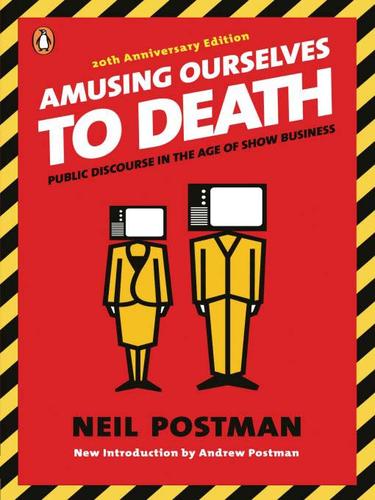Tilde Lowengrimm reviewed Amusing ourselves to death by Neil Postman
Terrified of television
I'm primed to be skeptical of any claim which sounds like the core one in this book: that there's something pernicious about The New Communication Tool, and that it will erode our society and culture.
But. Postman published Amusing Ourselves to Death in 1985, and has been specifically correct about several… let us say… arcs? of transformation in culture & communication; in the way we value wisdom, knowledge, information, and data; and in our approach to disagreement, debate, and argument; among others. Postman clearly isn't exactly right in the particulars — the cultural role of television has changed substantially, and even newer new media has further adapted down this path. He didn't specifically anticipate Twitter or Facebook or TikTok, but his heart is in the right place by extrapolation from television.
Still. Is society worse, or just different? Are the ways societ has improved supported by …
I'm primed to be skeptical of any claim which sounds like the core one in this book: that there's something pernicious about The New Communication Tool, and that it will erode our society and culture.
But. Postman published Amusing Ourselves to Death in 1985, and has been specifically correct about several… let us say… arcs? of transformation in culture & communication; in the way we value wisdom, knowledge, information, and data; and in our approach to disagreement, debate, and argument; among others. Postman clearly isn't exactly right in the particulars — the cultural role of television has changed substantially, and even newer new media has further adapted down this path. He didn't specifically anticipate Twitter or Facebook or TikTok, but his heart is in the right place by extrapolation from television.
Still. Is society worse, or just different? Are the ways societ has improved supported by new media, and how does that compare with its support for the ways society has degraded? Did television & social media cause misinformation & polarization, or did they just happen simultaneously? I'm not going to come down on Postman's side here. But I also have unusually-easy access to unenshittified media, and I might be more tempted if I had to live through the way normal people experience the Web all day.
Regardless of valence, I don't think these changes are reversible. We can't go back, we can just adjust our paths forward. "Old man yells at TV." is a trite tale. "Dysfunctional society no longer able to coordinate changes needed to survive the changes causing dysfunction." is probably more distressing. And the problem with all questions about how to improve society somewhat is that so many of the levers of change are locked out for various reasons, so "What should we do about this?" ends up always having deeply radical answers because nothing is superficial. Or perhaps that's just because almost all simple problems have been solved, and we keep being left with more and more challenging ones.
Please like and subscribe, and don't forget to hit that bell.



